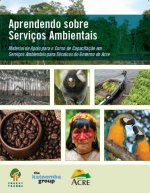Beto Borges
DirectorCommunities and Territorial Governance Initiative

Beto was born and raised in São Paulo, Brazil, where he obtained an AA degree in industrial chemistry from Escola Técnica Oswaldo Cruz and worked as an ecotourism guide in the Atlantic rainforest, while pursuing nature photography and rock climbing. Beto holds a Bachelor’s of Science in Conservation and Resources Studies from the University of California, Berkeley, and an MBA in Strategic Leadership from the Dominican University of California. Previously, he was Director of the Brazil Program of the Rainforest Action Network, promoting forest policies, community economic development and indigenous land demarcation in the Amazon region. He also worked for Aguirre International, evaluating environmental programs for AmeriCorp-USA and was the Manager of Sustainable Harvesting at Shaman Pharmaceuticals, developing ethnobotanical drugs from rainforest medicinal plants. As the Executive Director of Adopt-A-Watershed, he worked on watershed conservation through place-based learning methodologies. Beto also was a Program Officer with the Goldman Environmental Foundation, selecting finalists for the Goldman Environmental Prize and evaluating project proposals for funding. Beto has also consulted for Aveda Cosmetics, Conservation International, Instituto Terra, Occupational Knowledge International, and Wildlife Conservation Network, and others. He was co-chair of Grantmakers Without Borders and currently sits on the board of the Global Greengrants Fund, Earth Island Institute, and the Environmental Law Defenders Center. He is fluent in Portuguese, English, and Spanish.
Accelerando la Inclusión y la Mitigación de Emisiones (AIME)
By Beto Borges, Rebecca Anzueto - Forest Trends, Forest Trends View PublicationConsentimento Livre, Previo e Informado
By Beto Borges - Forest Trends View PublicationCompensação por Serviços Ambientais
By Beto Borges, Rebecca Anzueto - Forest Trends, Forest Trends View PublicationMatriz de Iniciativas Brasileiras de Pagamentos por Serviços Ambientais
By Beto Borges, Forest Trends - Warwick Manfrinato, PLANT Inteligencia Ambiental View PublicationProjeto Carbono Surui
By Beto Borges - Forest Trends View PublicationServiços Ambientais & Compensação
By Beto Borges - Forest Trends View PublicationServiços Ambientais & Compensação
By Beto Borges - Forest Trends View Publicationintroduction to Ecosystem Services and Climate Change
By Beto Borges - Forest Trends View PublicationFarmers Rights and Social–Environmental Best Practices
By Beto Borges - Forest Trends View PublicationIntroduction to Ecosystem Services
By Beto Borges - Forest Trends View PublicationDefining Payments for Ecosystem Services
By Beto Borges - Forest Trends View PublicationAprendendo sobre Servicios Ambientais
By Rebecca Vonada, Beto Borges - Forest Trends, Forest Trends View PublicationThe State of Acre, Brazil recently created a state PES scheme based on the carbon market, but also biodiversity and watershed services. This booklet contains key concepts about payment for ecosystem services; it was prepared for technical staff of the government in the state of Acre, Brazil.
Caso Surui REDD+
By Beto Borges - Forest Trends View PublicationRestoring Forests, Strengthening Communities
A bright blue river snakes its way through towering trees, the rainforest alive with sounds of tropical birds. Mist shrouds a pine-covered mountaintop, an expanse of deep green surrounding it on all sides. Forests around the world are admired for their beauty and tranquility, but forests are also essential to our lives and livelihoods. In […]
How the EUDR can support Brazil’s path to zero deforestation
Beto Borges, Director of our Communities and Territorial Governance Initiative, speaks with André Lima, Brazil’s Secretary for Controlling Deforestation and Controlling Territorial Ordinance within Brazil’s Ministry of Environment. Together, they discuss Brazil’s efforts to reduce deforestation and how they intersect with the EU’s Deforestation Regulation coming into play at the end of this year. This […]
¿Cómo puede beneficiar la financiación climática a las comunidades con bosques en pie?
Los esfuerzos mundiales para frenar el cambio climático dependen del fin de la deforestación ilegal o insostenible. La deforestación tropical y otros tipos de conversión del suelo son responsables del 20% de las emisiones mundiales. Proteger los bosques del mundo evita estas emisiones, protege la biodiversidad, proporciona hogares y medios de vida a las comunidades […]
Como o financiamento climático pode funcionar para comunidades com florestas em pé
Os esforços globais para conter as mudanças climáticas dependem do fim do desmatamento que é ilegal ou, ainda que legal, que é realizado de maneira insustentável. O desmatamento de florestas tropicais e outras conversões de terra são responsáveis por cerca de 20% de todas as emissões globais. A proteção das florestas de todo o mundo […]
How climate finance can work for communities with standing forests
Global efforts to curb climate change rely on putting a stop to deforestation that is illegal or unsustainable. Tropical deforestation and other land conversion account for about 20 percent of global emissions. Protecting the world’s forests prevents these emissions, safeguards biodiversity, provides homes and livelihoods for traditional communities, and can absorb as much carbon dioxide […]
Por que os direitos indígenas são fundamentais para a nova regulamentação do mercado de carbono do Brasil
O governo federal brasileiro está elaborando um novo projeto de lei que definirá a estrutura do mercado brasileiro de carbono. Com essas discussões em andamento, é essencial considerar como essa nova regulamentação afetará os Povos Indígenas. O Ministério dos Povos Indígenas (MPI) do Brasil está no centro dessas discussões e o Presidente Luiz Inácio Lula […]
Why indigenous rights are central to Brazil’s new carbon market regulation
The Brazilian Federal Government is preparing a new bill that will determine the structure of the Brazilian carbon market. With these discussions underway, it is essential to consider how this new regulation will affect Indigenous Peoples. At the heart of these discussions is Brazil’s Ministry of Indigenous Peoples (MPI). President Luiz Inácio Lula da Silva […]
6 New Indigenous Territories Officially Recognized in Brazil
Friday was a historic day in Brazil for indigenous peoples and the planet. President Lula demarcated 6 new indigenous territories totaling just over 2,300 square miles (612,000 hectares), with 90 percent of that area in the most remote parts of the Amazon. To give you a picture, this area is equivalent to about half the […]
The legal structure for biodiversity benefits-sharing already exists in Brazil. Here’s how it can serve communities
Beto Borges, Director of the Communities and Territorial Governance Initiative, speaks with Rodrigo Sales, an environmental lawyer from Brazil and expert in environmental markets, climate change, and sustainability law. They discuss a recent collaborative analysis of the Brazilian Biodiversity Law and how it can be an effective instrument for ensuring indigenous and local communities receive […]
What Brazil’s new government means for indigenous and local forest-based economies
For the first time in years, there is an administration in Brazil that is aligned with our priorities here at Forest Trends – in particular those of supporting local and indigenous environmental defenders, and advancing governance and policy that aims to conserve the environment rather than exploit it. Brazil is in the midst of several […]
However You Look at It, Our Future is Forests
Debates about carbon offset types and REDD+ are important, but what ultimately matters is scaling tropical forest finance fast with integrity, and making sure that forest communities are at the table. Tropical forests are a key tool for near-term emissions reductions as part of a larger strategy to meet Paris climate targets. A portfolio of […]
Using local knowledge and materials is the ultimate gift: A conversation with Paula Ellinger
Beto Borges: We have been partners with Kurumi since its early days, which we’re really excited about. We’d like to hear a little bit more about what inspired you to base your business off of partnerships with indigenous artisans. Paula Ellinger: Kurumi, which means “child” in Tupi-Guaraní, was born as an idea to provide alternative […]
An Amazon Bioeconomy is a path forward for Brazil
Director, Forest Trends’ Communities and Territorial Governance Initiative Attacks on indigenous territories by land grabbers have been increasing in recent weeks in Brazil. Land conflicts in general have reached a troubling milestone – 1,576 cases in 2020 – the most since the Pastoral Land Commission began recording in 1985 and 25% higher than the number […]
“I saw the collision of two worlds.” Estêvão Ciavatta on the frontlines of forest conflict in the Amazon
Beto Borges, Director of Forest Trends’ Communities and Territorial Governance Initiative, talks with award-winning Brazilian screenwriter, director, and film producer Estevão Ciavatta on conflicting visions for development in the Amazon, land grabbing, and the role he hopes his film, Amazonia Undercover, can play in spotlighting these tensions and environmental destruction in Brazil. This conversation has […]
The Long View: A Conversation with Céline Cousteau
Beto Borges, Director of Forest Trends’ Communities and Territorial Governance Initiative talks with Céline Cousteau, humanitarian, environmental activist, filmmaker, and founder of the Javari Project for a conversation on her work with indigenous communities in Brazil. This conversation has been edited and condensed from its original version. Beto Borges: Thank you for being here, Céline. You’ve recently […]
How to Redesign Climate Funding to Better Support the Amazon’s Indigenous Communities
International climate funding, including the REDD+ mechanism, is falling short when it comes to supporting indigenous forest guardians in the Amazon and elsewhere in the world, according to a panel of experts convened on Thursday, December 10th for a virtual roundtable on the subject. The discussion, hosted by Forest Trends and moderated by Andrew Revkin […]
Why Some Indigenous Communities are Weathering the COVID-19 Crisis Better Than Others
Indigenous peoples in the Amazon are dying of COVID-19. In Brazil, indigenous peoples are being lost at twice the rate of their non-indigenous compatriots. The pandemic arrived at a time when indigenous communities were already facing a wave of new discrimination, isolation, and existential threats from outside exploitation of their land. As government inaction is […]
How Indigenous Technology Can Drive New Discoveries In Western Medicine
Forest Trends’ Beto Borges, Director of our Communities and Territorial Governance Initiative, talks to Dr. Steve King, EVP Sustainable Supply, Ethnobotanical Research & IP in a wide-ranging conversation on indigenous technology, a game-changing new drug developed from an Amazonian tree, and the next frontier in scientific discovery. This conversation has been edited and condensed from […]
The “Amazon Strategy” – How to Build Resilient Supply Chains and Food Systems post-Pandemic
The Amazon rainforest has been shaped for millennia by human occupation, but of a kind that is very different from the logging, razing for cattle ranches, and plowing for soy that we see today. Traditional Amazon systems have been based on diversity, not monoculture, taking advantage of a multitude of different crops and wild-harvested foods, […]
The COVID-19 Pandemic: An Update on Our Work
We are preparing for social distancing measures to be widespread and for strong limits on travel until at least June 2020 and possibly as long as a year. This has required some re-strategizing on how we’ll do our work. On the ground Some field research and project implementation will be unavoidably delayed in order to […]
A Call to Action at COP25: Climate Finance Must Stop Excluding Indigenous Communities
To stabilize the forest frontier, we need to invest directly in the communities living there. Indigenous and traditional communities control one-third of remaining tropical forests. In the Amazon, the largest tropical forest on the globe, they own 210 million hectares (or some 519 million acres). As a direct result of their stewardship, deforestation rates are […]


